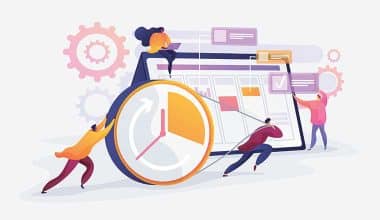Making the most of the time you spend talking to prospects during a job interview by properly preparing will help you decide who is the best candidate for the job. One of the most crucial aspects of interview preparation is knowing what questions to ask. I have compiled the best technical and casual interview questions to ask the interviewee in this article. Let’s dive in!
Best Interview Questions to Ask Interviewee
It’s crucial to ask the proper questions of the applicant and reveal the best replies while conducting interviews to fill major job openings in order to make a better-educated recruiting selection. Here are some of the best interview questions to ask the interviewee:
#1. What Drew You to Submit an Application for This Job?
This is one of the best interview questions to ask the interviewee. This question should allow you, the interviewer, to determine whether the applicant is enthusiastic about the employment or if they merely applied without doing any research. Inquire with them about how they would respond to particular scenarios when you analyze their experience and match it to the job vacancy.
#2. How Do You Approach Decision-Making?
You can learn more about the interviewee’s critical thinking abilities and the organizational techniques they use in decision-making circumstances by asking them this question. Is their procedure carefully planned out and coordinated, or is it just something that is done quickly?
#3. What Attributes Make You the Best Applicant for This Position?
For a number of reasons, this is a significant query. The first and most obvious reason is that this question offers the interviewee the chance to go into more detail about the skills they have that make them the greatest fit for the position. Also, it enables applicants to pinpoint any skills that may be crucial for the job but weren’t included in their résumé. This question also makes sure the applicant is aware of the requirements for the position and the abilities necessary to succeed in it.
#4. What Long-Term Career Objectives Do You Have?
You can infer from the way your prospect responds to this question how they would position themselves within your organization over the long run.
If they expressly mention your company in their response, they are considering staying there in the future and will put in a lot of effort to further their own professional objectives while also putting in a lot of effort for the company. It also enables you to determine their personality.
#5. Since the Initial Interview, Do You Have Any New Inquiries Regarding the Company or the Position?
This provides the candidate with the chance to ask questions that they might not have thought of during the tense initial interview. You can both see how much preparation they have put into this interview thanks to this, which is advantageous for both of you. Also, it provides them the chance to ask any questions they may have had while driving home following the initial interview. If they came prepared or were more confident this time, they can now fill in any gaps that were left.
#6. How Far Along Are You in the Job Hunting Process?
If they are the best candidate for the job, you might learn which other jobs they have applied for and what level of the hiring process they are at by asking them this second interview question. This could provide you with some insight into your competition and the challenges you might face. If they’ve lately participated in multiple interviews, you might find yourself waiting for their response or making a counteroffer to remain competitive. To avoid bias or any form of discrimination, make sure you ask every applicant the same questions as you would in any interview.
#7. What Skills Do You Believe Are Necessary for This Position?
What they think of the role is one of the top second-interview questions you can ask prospects. This raises concerns about their capacity to understand the function and think critically rather than directly asking them what they could contribute. It also encourages them to describe the abilities they now possess and how they measure up to the requirements they perceive.
It will essentially demonstrate their expectations for the position, how they understood the job description, and whether they have a proper understanding of what is involved.
In order to avoid any unpleasant surprises after they begin working, you can clarify anything they may have misinterpreted. Because you didn’t mislead them and they carefully researched the job before accepting an offer, this will enhance retention rates.
#8. Why Would You Not Be a Good Fit for This Position?
Offering applicants the option to consider what they might need to improve on enables them to consider concerns and potential solutions specifically, how they would handle any potential professional difficulties in the post. You can tell how motivated they are to succeed by how positive or negative their response is.
If they say they are open to learning and growth, you might have a more promising applicant than you think. A person with a growth mentality is much more likely to advance and learn than someone with a fixed mindset, who simply thinks that they won’t be able to achieve something if they can’t do it right now.
#9. What Alterations Would You Make to This Company?
Using the research they may or may not have done before the interview, your prospect is encouraged to analyze the company in a positive way. That demonstrates their level of familiarity with your business, and you can determine whether they have dealt with you in the past. You can observe how they would respond to challenging inquiries and how they would successfully effect change.
#10. What Base Salary Are You Hoping to Make from This Position?
The applicant’s pay expectations can be understood with the help of this inquiry, which also provides you the opportunity to control them if they are out of line. On the other hand, your prospective employee may have done their homework and determined that the wage you’re providing is below their market value. With the help of our salary guidelines, you and your partner can compare salaries for positions in your industry and geographical area that you may be hiring for.
#11. Describe the Type of Workplace You Would Prefer
Your understanding of their response to this could help you learn more about their personality and working style. These would function well for your business if they meet the description of your own workplace. This will boost the likelihood that they’ll stay and stop you from hiring someone who doesn’t fit in.
When someone applies to work for you after hearing about another organization, they may be disillusioned and more likely to leave later.
#12. If Hired for This Position, When Could You Begin?
This is a common topic, but it’s a crucial one because hiring new employees may be a logistical nightmare. It may only be comparative because some candidates will be able to begin more quickly than others. Also, it demonstrates their dedication to their current position and their professionalism.
#13. What Has Your Usual Position Been on a Team?
You can learn from this question about the interviewee’s past employers’ impressions of them and how they might get along with coworkers. Were they ever given project management responsibilities, or did they always play a more supportive role? This question is one of the best interview questions to ask the interviewee.
#14. What Would Your Co-workers Say about You?
By doing so, you’ll gain a better understanding of how they see themselves in the eyes of others and learn more about their aptitude for teamwork. Do they have a reputation for being quiet, silly, outgoing, communicative, a workaholic, or anything else?
In order to determine whether the response reflects the positive personality attributes you are seeking, be sure to build and frequently consult your ideal candidate personas.
#15. Do You Function Better Alone or in a Group?
If the job requires the applicant to work more independently or more collaboratively, this question is extremely crucial. You can tell if a candidate will be a good addition to your team based on their response and the job requirements.
#16. What One Quality Distinguishes You from the Other Job Candidates?
This is an excellent technique to gauge how well the applicant comprehends the position and its requirements. Candidates are forced to choose which skill is most crucial for the position by being given the option of selecting only one.
#17. What Spurs You on to Work?
Even though it’s a straightforward question, it calls for a lot of thought from the interviewee and frequently sparks insightful conversations from a candidate trying to figure out what really drives them. If they merely give a cursory response like, “I like a challenge,” this may indicate that they are a less-than-stellar choice. To gain a deeper understanding of their motivations, you might need to question them more deeply.
#18. Why Are You Leaving Your Current Position, or Why Did You Leave It?
You can learn more about the candidate’s job preferences by asking this question. The majority of applicants will outline a few drawbacks of their current employment that prompted them to look for new employment; these drawbacks can reveal what the applicant is looking for in a new position. Also, it can reveal any warning signs in a possible employee that you may not want, including excessive whining or negativity.
#19. What Does “Hard Work” Mean in the Workplace?
Organizations progress at varying rates from one another. An applicant may not be a good fit for a position requiring the constant output of work in a fast-paced, deadline-driven atmosphere if they are accustomed to working in a relaxed setting with few strict deadlines.
#20. How Do You Think Your Current (Or Most Recent) Company Could Enhance Its Overall Operations to Be More Successful?
With this question, you can get a good understanding of how well the interviewee can evaluate the overall productivity of an organization. It may also help you understand why they are dissatisfied with or considering leaving their current job.
#21. What Are Some Areas Where You May Use Improvement?
It might be a show of courage to disclose your deficiencies during the interview since every job applicant has flaws in their character or qualifications.
#22. What Are Your Main Competitive Advantages for a Business?
An effective predictor of a winning personality is a candidate’s capacity to highlight their advantages while still remaining humble. This also allows the candidate a chance to discuss and relate their skills to the position they are interviewing for, highlighting qualities that will support the company’s objectives.
#23. Describe a Challenging Work Circumstance You Overcame
Professionals and true leaders frequently shine brightest and learn the most when under intense strain and stress.
Technical Questions to Ask Interviewee
The term “technical interview” refers to an interview for a job in the technology sector, such as information technology. Technical interviews can last from an hour to a full day and can be conducted over the phone, online, or in person. Traditional interview questions, brainteasers, technical competency tests, and problem-solving inquiries are all possible.
The technical interviewer will evaluate your technical knowledge, skills, and talents in relation to the requirements of the particular job you are seeking for. The interviewer will evaluate your technical knowledge and skills in addition to how you will fit into the company’s culture and how you approach problem-solving. Here are a few technical questions to ask the interviewee:
#1. Which Coding Language Are You Most Familiar With?
To find out if you fully comprehend how to use the language they anticipate you to use and if you feel comfortable using more than one language, the interviewer will likely ask you a question about the coding languages you are familiar with. Mentioning the exact coding languages you have experience with and are familiar with is crucial when responding to this question. Choose a specific programming language that you are most familiar with, and explain why.
#2. How Does a San Work and What Does It Do?
This interview question tests your technical expertise regarding a particular network that you will need to be knowledgeable about to succeed in your role. In your response, be sure to explain what SAN is, what it accomplishes, and how you would utilize it in the position for which you are seeking.
#3. When Is Denormalizing Database Design Acceptable?
This more difficult technical interview question gauges your ability to weigh the benefits and drawbacks of using denormalization for database efficiency. Denormalization will affect what a database can perform, so it’s crucial to explain the advantages and disadvantages of utilizing this approach and to pinpoint when it would be suitable to apply it.
#4. What Function Do Continuous Integration Systems Play in the Automated Construction Process?
With this question, the interviewer wants to make sure you are aware of continuous integration technologies and how they are utilized in the automated build process. Provide a concise definition of continuous integration and describe how it is used in the context of the automated build process to adequately respond to this issue.
Casual Interview Questions to Ask Interviewee
The use of informal interview settings has grown in popularity among both recruiters and candidates. When compared to conventional interview styles, these interviews are typically more informal and instructive. The questions asked in informal interviews are frequently the same as those in formal interviews. In contrast, informal interviews may be designed to elicit more candid responses from the interviewee. Here are a few casual interview questions to ask the interviewee:
#1. How Are You Feeling?
It is a straightforward, open-ended question. That can be a useful indicator of how at ease they feel and it invites the candidate to talk about whatever is on their mind at the time. A brief, amusing narrative about why this morning was chaotic at home is a fantastic indication the applicant feels comfortable opening up to you, as opposed to a curt, one-word response like “OK,” which signals the candidate isn’t fully engaged or comfortable talking with you yet.
#2. Describe Yourself to Me
The information that interviewees believe is most pertinent about themselves is frequently provided in response to inquiries like this one. Anticipate the best possible interpretation of the response, but push the interviewee to go into further detail. This type of open-ended question might yield answers that are more informative the longer they are.
#3. Which Hobbies Do You Enjoy?
It serves two purposes and is quite straightforward. Secondly, the response reveals whether your potential new employee is an extreme sports fanatic or a stamp collector. Second, it inspires the subject to be honest and open up. Individuals often engage in lengthy conversations about the things they find most enjoyable, which provides them an opportunity to learn more about the person.
#4. How Long Have You Been a Resident of This Area?
This topic stimulates conversation about the interviewee’s previous homes, romantic relationships, employment background, and other facts revealing their history and personality.
#5. Is this Workplace What You Anticipated?
A question like this allows the applicant the option to go into more detail about the office’s furnishings, wall art, noise level, or anything else they’d like to mention. Everything is mentioned is probably something they heard straight away and have been considering as they awaited the interview to start. An applicant who makes a comment about the appearance of the office, for instance, maybe a visually-oriented individual. At the same time, someone who comments on the enthusiasm of other employees may be sensitive to work teams and interpersonal dynamics.
#6. Tell Me About Your Previous Employer, Business, or Manager
Interview subjects can speak freely in response to open questions like this one. While asking this kind of inquiry, try to provide as little guidance or prompting as you can. You may learn more from a speaker’s choice of information regarding a former work and the more freedom they have to do so.
#7. Why Did You Exit?
This more specific query relates directly to the potential driving force behind the applicant’s decision to change jobs. You might not gain much insight from the response if the circumstances were beyond the interviewee’s control, such as the expiration of a contract or widespread layoffs. If the response, however, is that there was a personal conflict, the applicant underperformed, or some other extremely pertinent issue, you can add that to your evaluation of the jobseeker’s appropriateness for your position.
#8. What Is the First Thing That Your Former Employer Would Say About You?
This inquiry has some room for interpretation. Yet, it asks the candidate to describe their own performance at a previous job and how they feel their managers saw them. Pay great attention to how the candidate seems to feel personal about their most recent work. Seeing how people respond to authority and sustain healthy working relationships and limits can provide you with important information about them.
#9. After You Were Hired, Did Your Former Employer Offer Training Courses?
Asking this question can be quite fruitful. When the response is “no,” you can sometimes continue. In others, you could discover a lot about the variety of abilities this individual possesses. Your candidate may have talents that go beyond their apparent certification, such as programming language expertise if a former company paid for on-the-job training in that area. Applicants that are enthusiastic in their responses to this question are also likely to appreciate acquiring new abilities and may actively look for ways to enhance their performance at your business.
#10. Do You Have a Flexible Schedule?
Even if your employer has a rigid schedule and seldom requires overtime, you should still ask this question. Your candidate should ideally be flexible with shift changes and unusual hours. Keep an eye out for a candidate who responds too soon; an instant pledge of limitless flexibility is likely not sincere or sincere enough. The ideal candidate will instead pause to consider their schedule before responding with precision to how much notice they require prior to a significant schedule change. This implies that the candidate is taking your query seriously and has provided you with a sincere response.
#11. Can You Change Locations?
This is comparable to scheduling inquiries. Once more, be on the lookout for qualified responses that show a serious outlook and candor regarding constraints.
#12. What Are Your Impressions About Our Company?
It’s always a good idea to end a relaxed interview with a question that allows the candidate to ask you anything on their mind. Although the main goal of the interview is to learn more about the individual, the specific questions that are asked can reveal more about their priorities and career aspirations.
What Are the Top 5 Questions to Ask an Interviewee?
The following are the top 5 questions to ask an interviewee:
- What career accomplishment makes you most proud?
- Tell me something about yourself that isn’t on your resume
- Why do you want to work here?
- What made you want to apply for this position?
- What are your greatest weaknesses?
- What are your greatest strengths?
What Are 7 Good Questions to Ask in an Interview?
Here are good questions to ask the interviewee:
- Where do you see yourself in five years’ time?
- What are your strengths/weaknesses?
- Why should I hire you?
- Tell me about yourself/your work experience
- Why do you want this job?
- What are your salary expectations?
- Why are you the right fit to succeed in this role?
What 3 Questions Should I Ask the Interviewer?
Here are questions you can ask an interviewer:
- What are the key responsibilities of this position?
- How does this position fit into the company?
- How would you describe the ideal candidate?
Final Thoughts
I do hope this helps you out when you need questions to ask the interviewee. Do try your best to ask every necessary question because it will help you know your employees better.
Related Articles
- Good Interview Questions to Ask: Top Strategic Questions to Ask
- 20 QUESTIONS TO ASK HIRING MANAGER IN 2023
- INTERVIEW QUESTIONS TO ASK CANDIDATES.
- CANDIDATE RELATIONSHIP MANAGEMENT SYSTEMS: Guide To The Processes
- INTERVIEW PREPARATION TIPS: A Comprehensive Guide For Job Candidates
- WHAT TO SAY IN AN INTERVIEW: Tips on What To Say






